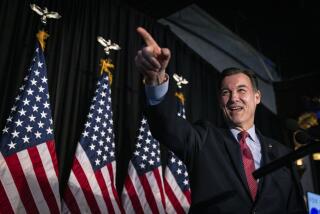Trans-Pacific Partnership trade deal exposes rift between Obama and Democrats
President Obama stood in a posh home overlooking the Golden Gate Bridge one night last week, ticking off Democratic achievements during his time in office before lightheartedly noting recent turbulence within the party.
Among those in his audience at the party fundraiser was Rep. Nancy Pelosi, the House minority leader and, in an unusual turn, among Obama’s most visible opponents of late.
Obama and Pelosi have stood side by side to lead the Democrats in many successful political and legislative battles. Yet as a major Pacific Rim trade deal has come to the forefront in Washington in recent weeks, they are further apart than at any moment in Obama’s presidency, a schism that not only threatens to derail the trade pact, one of the president’s top priorities, but also has fostered some unusual political alliances in his final term in office.
The newly exposed rift within the broader Democratic Party has been dramatic and unrelenting, and on public display. There have been personal pleadings and private scoldings. Words have been said. Offenses taken.
Those shifting allegiances were nowhere to be seen amid the partisan pep talk at the home of billionaire donor Tom Steyer in Pelosi’s adopted hometown of San Francisco on Friday night. Obama called Pelosi his “extraordinary partner” after she’d credited him for the economic recovery and with making “remarkable changes” on immigration and climate change through executive action.
“As I think some of you may have noticed, it’s not like I agree with my Democratic caucus on everything,” Obama said before flashing a grin at Pelosi. “But on 98 percent of things, they’re moving in the right direction, and I know where their heart is, and I know what their values are, and I know what they care about.”
Unable to sway Democrats on his trade agenda, Obama did what often happens when political partners differ: He left his own party behind and took up with the opposition Republicans.
In many ways, the chasm between the president and his party on Capitol Hill magnifies the natural divorce of an executive trying to secure accomplishments on his way out the door and members of the legislative branch preparing to run for reelection in a matter of months.
The two are likely to finish the remaining 18 months of the Obama administration linked together on common goals, including the preservation of highway funds and fighting Republicans over budget cuts.
For now, though, as the trade bills proceed to the next round of voting this week in Congress, the Democratic divide will continue to splinter a party that has largely kept its internal affairs private.
“What we are doing,” said Democratic Rep. Steve Israel of New York, “is devouring each other.”
Obama is seeking to secure from lawmakers the authority to move ahead on the emerging 12-nation Trans-Pacific Partnership. Such an arrangement would give Congress only a simple yes-or-no vote on the trade deal, and future pacts but would give Obama the freedom to negotiate in a way that shows other countries the U.S. is committed to the deal, as the White House argues.
Last week, Pelosi made the stunning decision to buck Obama by joining liberal Democrats to set back a package of trade votes. Her move appeared to go beyond polite disagreement into a bold breach of party decorum.
To be sure, trade always has been an issue that divides Democrats, as liberal lawmakers worry that American workers suffer from cheaper labor abroad, while business-friendly Democrats believe freer trade will boost competition and economic growth.
Obama’s decision to all but abandon Democrats and reach across the aisle to Republicans is not much different from the strategy President Clinton used to approve the North American Free-Trade Agreement amid his own party’s discord.
Normally, the party’s “civil war,” as Republican Majority Leader Kevin McCarthy of Bakersfield has called it, would leave Republicans overjoyed with schadenfreude. “I would describe most of what’s going on in the last three weeks as close to bizarre,” said House Speaker John A. Boehner (R-Ohio).
Instead, the infighting sent Boehner and other Republican leaders scrambling to salvage the trade package, which also tops GOP priorities.
Pelosi’s decision may have surprised Washington, but it was no secret to Obama. The minority leader told the president she was inclined to oppose him when he stopped into her bright yellow office the morning of the vote last week.
Obama also made his pitch behind closed doors to congressional Democrats. The speech got off to a good start, as he talked about the party’s shared accomplishments together. But his appeal on trade policy left some lawmakers offended at his scolding tone.
Some thought the president hurt his cause more than helped.
Pelosi had spent days trying to save the president’s trade agenda, working privately with Boehner to tweak the legislation in hopes of soothing Democratic concerns.
In the end, it was not enough. The Democratic Party has become more liberal in recent years, just as the Republican Party has become more conservative, thanks largely to gerrymandering that has eliminated many swing districts. Most Democrats feel burned by NAFTA and past trade bills and opposed giving Obama the negotiating authority he sought.
Though Pelosi was likely to vote against the bill, she didn’t necessarily want to serve a defeat to the president.
“She really has been in a very difficult situation,” said Rep. Henry Cuellar (R-Texas), who backs the president on this issue.
But leading liberals had other plans, with a strategy to halt the trade package by tanking a companion bill.
Realizing her caucus had the votes to stop the trade agenda with or without her, Pelosi had little choice. She delivered an intense, if rambling, floor speech that showed the depth of the personal and party divide.
The moment Pelosi publicly broke with the president didn’t halt the trade agenda. It would have stalled regardless. But the decisive display of disunity gave Democrats the cover to more openly push back against the administration on trade as well as other issues.
As the debate moves to the Senate this week, Democrats are dug in for a fight.
“For many Democratic senators, trade has become the toughest economic issue,” said Sen. Ron Wyden (D-Ore.), who has been leading the effort to usher Obama’s trade package through that chamber. “It is not something that we just kind of did casually.”
Both the White House and Democrats downplayed the schism as simply a temporary bump in the road in an otherwise fruitful partnership.
“The relationship there is strong enough to withstand a policy difference on any single issue, even one as important as this,” Deputy White House Press Secretary Eric Schultz told reporters on the Air Force One flight to California.
Both sides point to the long list of legacy-defining issues the party has accomplished under Obama, including the Affordable Care Act and Wall Street reforms, and expect to continue that alliance.
“Think of your own relationships,” Pelosi said last week, when asked if theirs was strained. “You have a disagreement. If you never had a relationship, that might be problematic as you go forward. But we have a deep relationship of trust with the president. …
“We have deep friendships, deep respect, and move onto the next subject.”
More to Read
Start your day right
Sign up for Essential California for news, features and recommendations from the L.A. Times and beyond in your inbox six days a week.
You may occasionally receive promotional content from the Los Angeles Times.








